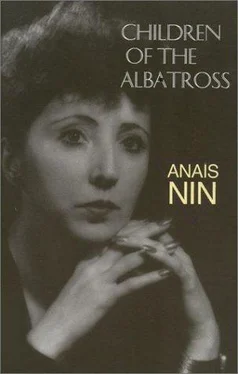Anaïs Nin - Children of the Albatross
Здесь есть возможность читать онлайн «Anaïs Nin - Children of the Albatross» весь текст электронной книги совершенно бесплатно (целиком полную версию без сокращений). В некоторых случаях можно слушать аудио, скачать через торрент в формате fb2 и присутствует краткое содержание. Год выпуска: 1959, ISBN: 1959, Издательство: Swallow Press, Жанр: Классическая проза, Эротические любовные романы, на английском языке. Описание произведения, (предисловие) а так же отзывы посетителей доступны на портале библиотеки ЛибКат.
- Название:Children of the Albatross
- Автор:
- Издательство:Swallow Press
- Жанр:
- Год:1959
- ISBN:9780804000390
- Рейтинг книги:4 / 5. Голосов: 1
-
Избранное:Добавить в избранное
- Отзывы:
-
Ваша оценка:
- 80
- 1
- 2
- 3
- 4
- 5
Children of the Albatross: краткое содержание, описание и аннотация
Предлагаем к чтению аннотацию, описание, краткое содержание или предисловие (зависит от того, что написал сам автор книги «Children of the Albatross»). Если вы не нашли необходимую информацию о книге — напишите в комментариях, мы постараемся отыскать её.
Children of the Albatross — читать онлайн бесплатно полную книгу (весь текст) целиком
Ниже представлен текст книги, разбитый по страницам. Система сохранения места последней прочитанной страницы, позволяет с удобством читать онлайн бесплатно книгу «Children of the Albatross», без необходимости каждый раз заново искать на чём Вы остановились. Поставьте закладку, и сможете в любой момент перейти на страницу, на которой закончили чтение.
Интервал:
Закладка:
Lawrence lived and breathed color and there was no danger of his dying of drabness, for even accidents took on a most vivid shade and a spilled pot of gouache was still a delight to the eyes.
He brought Djuna gifts of chokers, headdresses, earrings made of painted clay which crumbled quickly like the trappings for a costume play.
She had always liked objects without solidity. The solid ones bound her to permanency. She had never wanted a solid house, enduring furniture. All these were traps. Then you belonged to them forever. She preferred stage trappings which she could move into and out of easily, without regret. Soon after they fell apart and nothing was lost. The vividness alone survived.
She remembered once hearing a woman complain that armchairs no longer lasted twenty years, and Djuna answered: “But I couldn’t love an armchair for twenty years!”
And so change, mutations like the rainbow, and she preferred Lawrence’s gifts from which the colored powder and crystals fell like the colors on the wings of butterflies after yielding their maximum of charm.
Paul was carving a piece of copper, making such fine incisions with the scissors that the bird which finally appeared between his slender fingers bristled with filament feathers.
He stood on the table and hung it by a thread to the ceiling. The slightest breath caused it to turn slowly.
Paul had the skin of a child that had never been touched by anything of this earth: no soap, no wash rag, no brush, no human kiss could have touched his skin! Never scrubbed, rubbed, scratched, or wrinkled by a pillow. The transparency of the child skin, of the adolescent later to turn opaque. What do children nourish themselves with that their skin has this transparency, and what do they eat of later which brings on opaqueness?
The mothers who kiss them are eating light.
There is a phosphorescence which comes from the magic world of childhood.
Where does this illumination go later? Is it the substance of faith which shines from their bodies like phosphorescence from the albatross, and what kills it?
Now Lawrence had discovered a coiled measuring tape of steel in Djuna’s closet while delving for objects useful for charades.
When entirely pulled out of its snail covering it stretched like a long snake of steel which under certain manipulations could stand rigid like a sword or undulate like silver-tped waves, or flash like lightning.
Lawrence and Paul stood like expert swordsmen facing each other for a duel of light and steel.
The steel band flexed, then hardened between them like a bridge, and at each forward movement by one it seemed as if the sword had pierced the body of the other.
At other moments it wilted, wavered like a frightened snake, and then it looked bedraggled and absurd and they both laughed.
But soon they learned never to let it break or waver and it became like a thunderbolt in their hands. Paul attacked with audacity and Lawrence parried with swiftness.
At midnight Paul began to look anxious. His luminosity clouded, he resumed his hesitant manner. He ceased to occupy the center of the room and moved out of the focus of light and laughter. Like a sleepwalker, he moved away from gaiety.
Djuna walked with him towards the door. They were alone and then he said: “My parents have forbidden me to come here.”
“But you were happy here, weren’t you?”
“Yes, I was happy.”
“This is where you belong.”
“Why do you think I belong here?”
“You’re gifted for dancing, for painting, for writing. And this is your month of freedom.”
“Yes, I know. I wish… I wish I were free…”
“If you wish it deeply enough you will find a way.”
“I would like to run away, but I have no money.”
“If you run away we’ll all take care of you.”
“Why?”
“Because we believe in you, because you’re worth helping.”
“I have nowhere to go.”
“We’ll find you a room somewhere, and we will adopt you. And you will have your month of life.”
“Of life!” he repeated with docility.
“But I don’t want you to do it unless you feel ready, unless you want it so much that you’re willing to sacrifice everything else. I only want you to know you can count on us, but it must be your decision, or it will not mean anything.”
“Thank you.” This time he did not clasp her hand, he laid his hand within hers as if nestling it there, folded, ivory smooth and gentle at rest, in an act of trustingness.
Then before leaving the place he looked once more at the room as if to retain its enfolding warmth. At one moment he had laughed so much that he had slid from his chair. Djuna had made him laugh. At that moment many of his chains must have broken, for nothing breaks chains like laughter, and Djuna could not remember in all her life a greater joy than this spectacle of Paul laughing like a released prisoner.
Two days later Paul appeared at her door with his valise. Djuna received him gaily as if this were the beginning of a holiday, asked him to tie the velvet bows at her wrist, drove him to where Lawrence lived with his parents and where there was an extra room.
She would have liked to shelter him in her own house, but she knew his parents would come there and find him.
He wrote a letter to his parents. He reminded them that he had only a month of freedom for himself before leaving for India on the official post his father had arranged for him, that during this month he felt he had a right to be with whatever friends he felt a kinship with. He had found people with whom he had a great deal to share and since his parents had been so extreme in their demands, forbidding him to see his friends at all, he was being equally extreme in his assertion of his freedom. Not to be concerned about him, that at the end of the month he would comply with his father’s plans for him.
He did not stay in his room. It had been arranged that he would have his meals at Djuna’s house. An hour after he had laid down his valise in Lawrence’s room he was at her house.
In his presence she did not feel herself a mature woman, but again a girl of seventeen at the beginning of her own life. As if the girl of seventeen had remained undestroyed by experience—like some deeper layer in a geological structure which had been pressed but not obliterated by the new layers.
(He seems hungry and thirsty for warmth, and yet so fearful. We are arrested by each other’s elusiveness. Who will take flight first? If we move too hastily fear will spring up and separate us. I am fearful of his innocence, and he of what he believes to be my knowingness. But neither one of us knows what the other wants, we are both arrested and ready to vanish, with such a fear of being hurt. His oscillations are like mine, his muteness like mine at his age, his fears like my fears.)
She felt that as she came nearer there was a vibration through his body. Through all the mists as her body approached to greet him there was an echo of her movements within him.
With his hand within hers, at rest, he said: “Everyone is doing so much for me. Do you think that when I grow up I will be able to do the same for someone else?”
“Of course you will.” And because he had said so gently “when I grow up” she saw him suddenly as a boy, and her hand went out swiftly towards the strand of boyish hair which fell over his eyes and pulled it.
That she had done this with a half-frightened lau as if she expected retaliation made him feel at ease with her.
He did retaliate by trying jiujitsu on her arm until she said: “You hurt me.” Then he stopped, but the discovery that her bones were not as strong as the boys’ on whom he had tested his knowledge made him feel powerful. He had more strength than he needed to handle her. He could hurt her so easily, and now he was no longer afraid when her face came near his and her eyes grew larger and more brilliant, or when she danced and her hair accidentally swung across her face like a silk whip, or when she sat like an Arab holding conversation over the telephone in answer to invitations which might deprive him of her presence. No matter who called, she always refused, and stayed at home to talk with him.
Читать дальшеИнтервал:
Закладка:
Похожие книги на «Children of the Albatross»
Представляем Вашему вниманию похожие книги на «Children of the Albatross» списком для выбора. Мы отобрали схожую по названию и смыслу литературу в надежде предоставить читателям больше вариантов отыскать новые, интересные, ещё непрочитанные произведения.
Обсуждение, отзывы о книге «Children of the Albatross» и просто собственные мнения читателей. Оставьте ваши комментарии, напишите, что Вы думаете о произведении, его смысле или главных героях. Укажите что конкретно понравилось, а что нет, и почему Вы так считаете.












